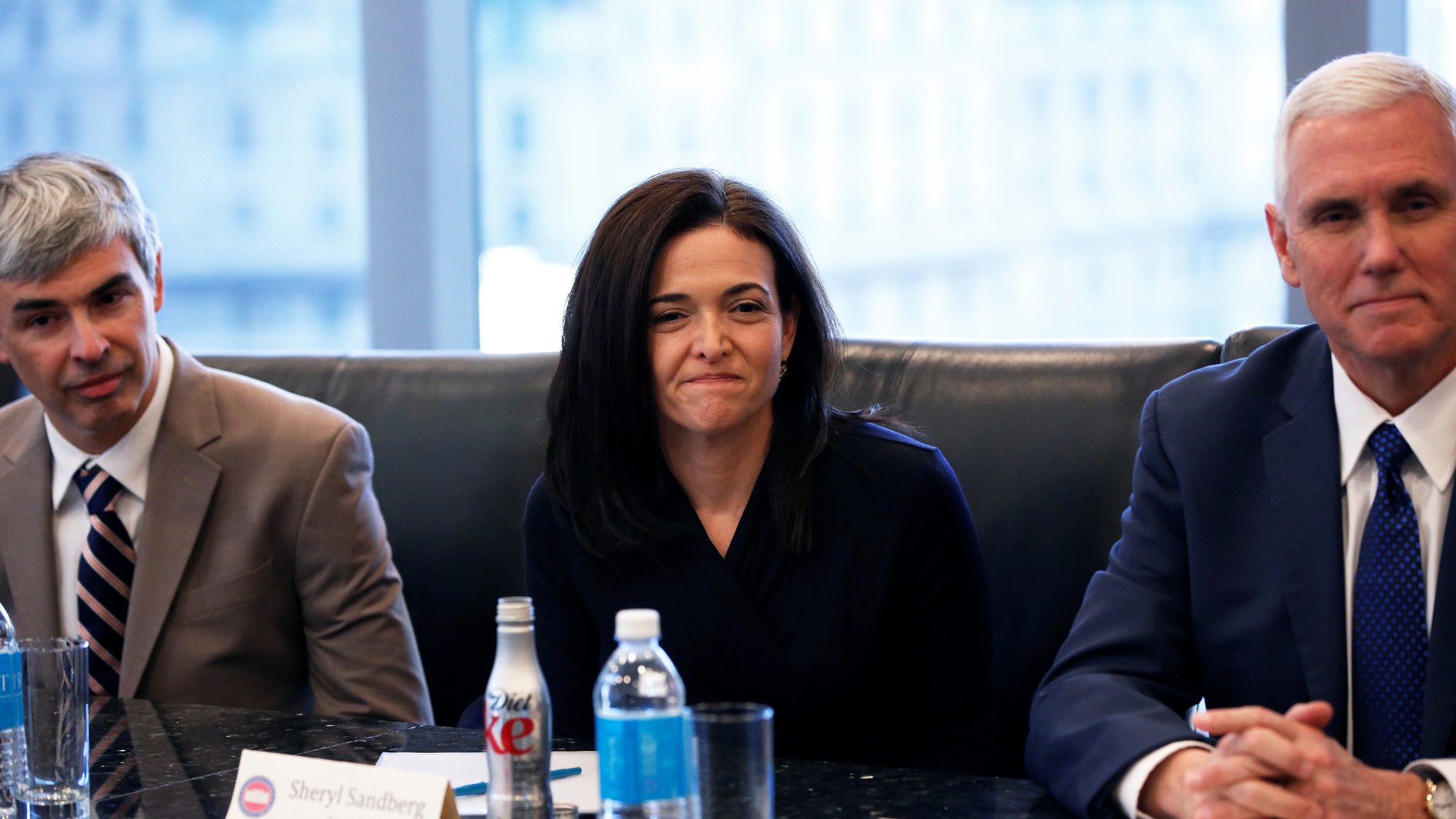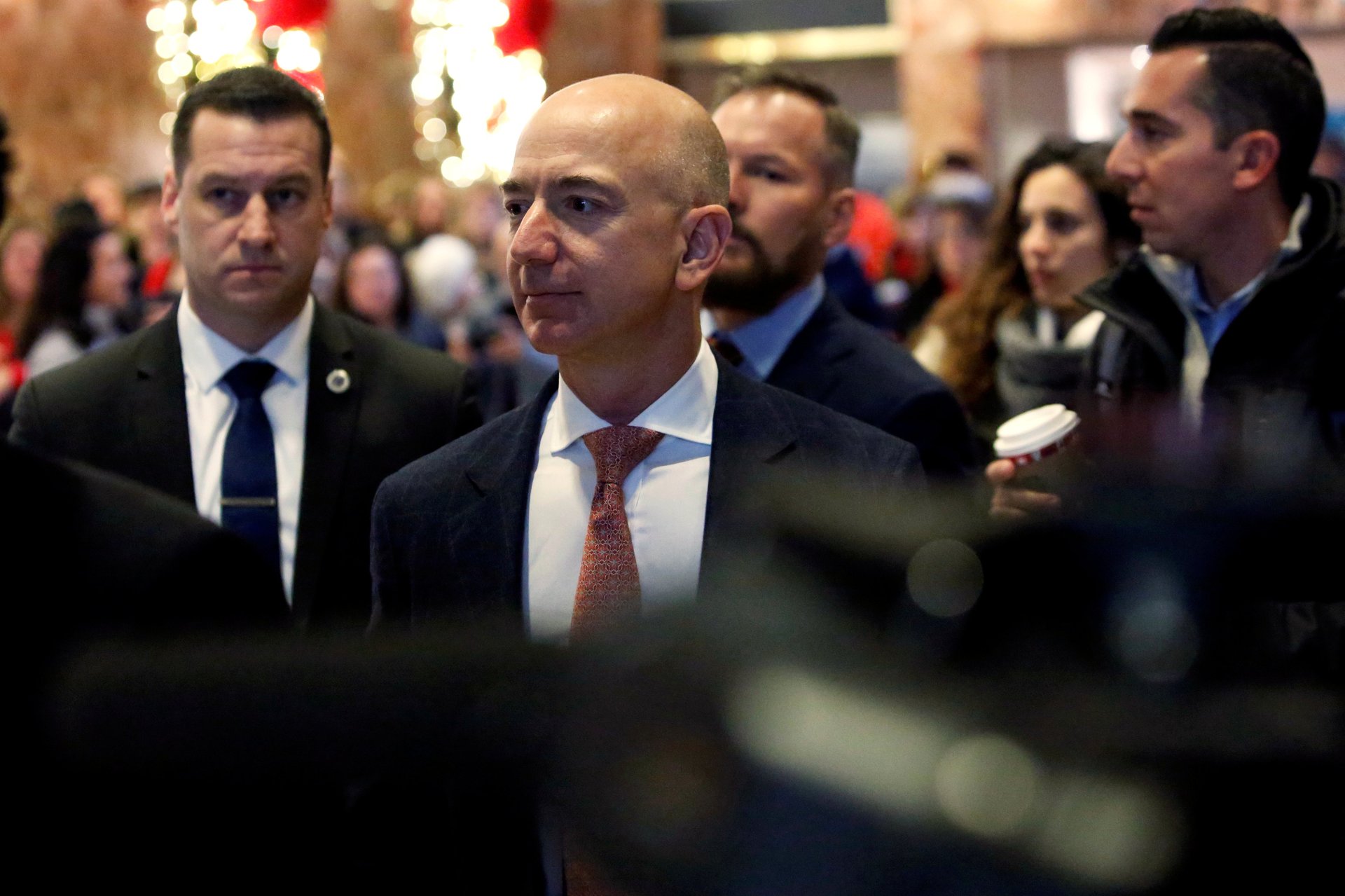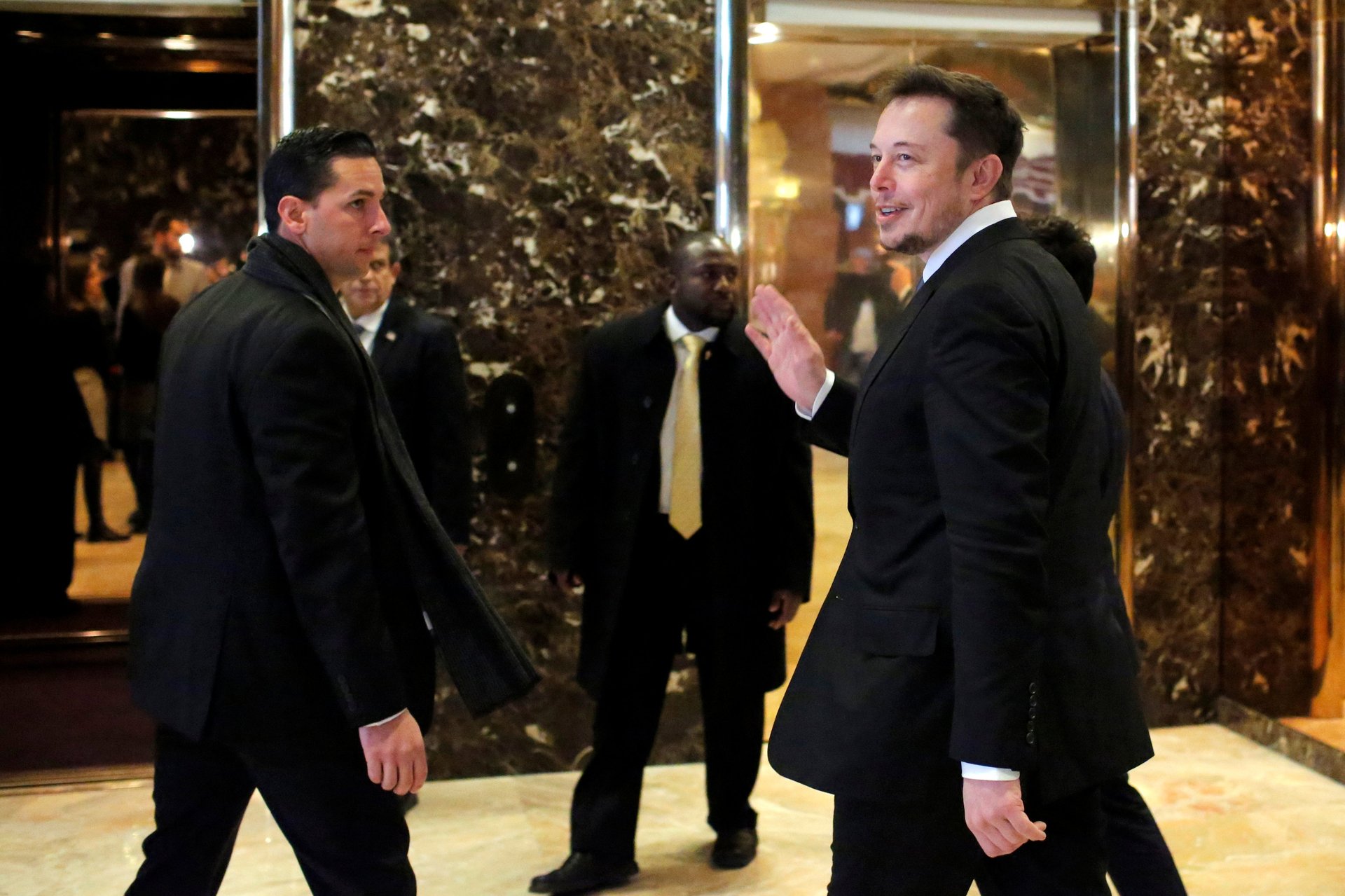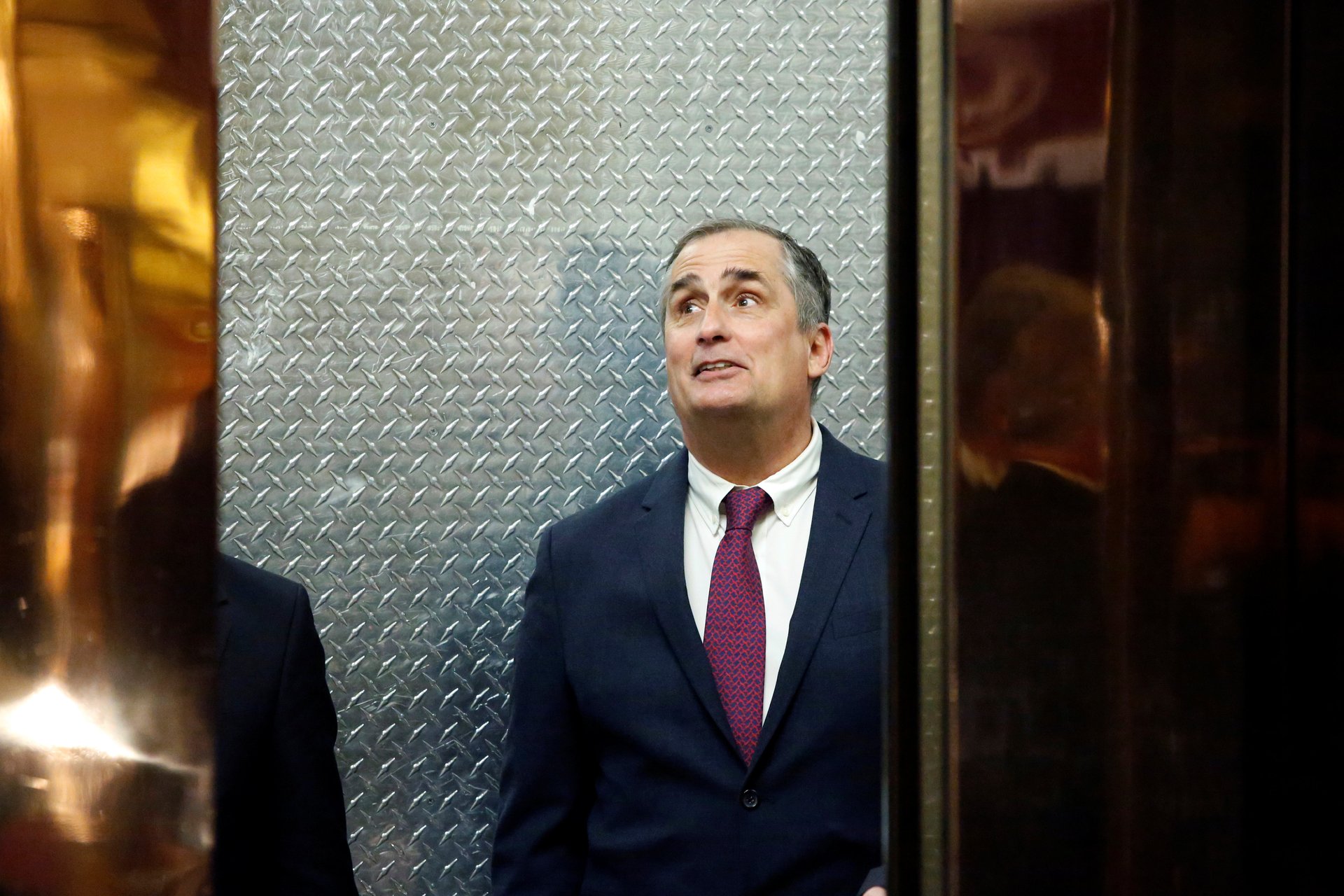Trump’s meeting with Silicon Valley’s elite was a naked power play, and they lost
Donald Trump is magnanimous only in victory. After an election campaign spent deriding Silicon Valley elites (an often mutual sentiment), he used their social media platforms to defeat their favored candidate. Then, as the dust began to settle, Trump declared himself on Silicon Valley’s team.


Donald Trump is magnanimous only in victory. After an election campaign spent deriding Silicon Valley elites (an often mutual sentiment), he used their social media platforms to defeat their favored candidate. Then, as the dust began to settle, Trump declared himself on Silicon Valley’s team.
“This is truly an amazing group of people,” he said at the parley in Trump Tower on Dec. 14. About a dozen of the world’s most powerful technology executives were there to ostensibly discuss tax reform, jobs, and investment. “There’s nobody like you in the world,” he said opening the two-hour meeting. “And anything we can do to help this go along, we’re going to be there for you. …You’ll call my people, you’ll call me. We have no formal chain of command around here.”
Executives’ responses, according to a transcript of the event, were almost adulatory. “I’m super excited about the possibility that this could be the innovations administration,” said Amazon CEO Jeff Bezos, who also owns the Washington Post, which reported alleged misdeeds by Trump during the campaign. Apple CEO Tim Cook expressed his eagerness to talk “to the president-elect about the things that we can do to help you achieve some things you want.” Facebook COO Sheryl Sandberg added she was “excited to talk about jobs.” Alphabet CEO Larry Page, Microsoft CEO Satya Nadella, and Tesla CEO Elon Musk were more restrained.
This was the moment Silicon Valley’s vaunted principles met realpolitik. And the results were not pretty. Trump, free to call the shots after attacking its leaders for months, showed everyone he is in charge, and willing to mete out punishment against those who cross him. Conspicuously absent from the gathering of almost-exclusively public company CEOs was Jack Dorsey, head of Twitter and the $5-billion payments company Square. His alleged offense? Blocking Trump’s anti-Hillary ad campaign, reports Politico, a #CrookedHillary emoji he planned to run on Twitter. Trump adviser Sean Spicer denied that accusation, arguing “the conference table was only so big.” (It’s worth noting that among the 25 seats there was room for four Trump family members: Trump’s sons Eric and Donald Jr, his daughter Ivanka, and son-in-law Jared Kushner. Equally troubling, the only private firm in attendance, Palantir, is a major government contractor and was co-founded by Trump advisor and Silicon Valley investor Peter Thiel, the company’s biggest backer.)



Trump’s election shattered Silicon Valley’s dominant view of politics as irrelevant or, at best, an obstacle to avoid on the way to global domination. Bill Gurley, an investor at Benchmark Capital, reiterated this shibboleth this August, arguing a Trump presidency was unlikely to have an “apocalyptic impact” on Silicon Valley given the intervening 2,849 miles. “Ironically, I happen to think one of the reasons Silicon Valley is so successful is that it is so far from Washington DC!” he wrote on Quora. “Technology is one where federal decisions do not have that much absolute impact on day-to-day life here.”
The Valley is no longer so confident. A wave of pledges to resist attacks on civil rights, deportations and other issues have emerged in the last week. On Dec. 12, a 500-person group from companies including Google, Stripe, IBM, and PlanetLabs vowed not to cooperate with potential proposals to build a floated Muslim registry or aid in “mass deportations” of people targeted by the US government. The next day, a second pledge by a group of prominent founders, investors, and executives vowed to ”unconditionally” resist the erosion of civil liberties, and any government agencies attempting to do so. “In order to have a healthy vibrant business environment, you need to ensure civil liberties do not regress,” said Dilawar Syed, president of Freshdesk and an organizer of the pledge, in an interview. “Our focus is on making sure the US as a place to do business remains open for all.”
But Trump’s victory may force Silicon Valley to look a lot more like other big industries that engage with both sides of US politics, regardless of personal preferences. Silicon Valley has baffled many Washington insiders by refusing to work with lawmakers they view as antithetical to their beliefs, even if it might benefit their business. In 2016, the technology community was all-in for Hillary Clinton, viewing a Trump’s presidency as either a farce or a near impossibility. Alphabet executive chairman Eric Schmidt personally spearheaded one of her digital efforts. Among tech employees and executives, the Democratic nominee reaped 95% of the $8.1 million in political donations as of October, compared to 4% for Donald Trump, reports FiveThirtyEight.
Silicon Valley, in fact, has much to gain from the Trump presidency, even if it stands to lose far more. Apple and other firms could repatriate billions of dollars stashed overseas under a tax reform deal, while major federal government contracts are in the offering. But immigration, cybersecurity, surveillance, anti-monopoly review, and net neutrality are all back on the table. A hard-won fight to keep the pipes of the internet accessible to all is likely to fall as a Republican-controlled Federal Communications Commission looks to roll back net neutrality rules in favor of Comcast and other incumbents, at the expense of Netflix and startups. Healthcare startups built around Obamacare’s insurance markets may falter or fail. Immigration reform, an issue dear to Silicon Valley given its reliance on foreign talent, is a bête noire in the Trump White House.
It’s not that Silicon Valley won’t play ball with governments hostile to its values. Scruples have just tended to end at the US border. Google, Facebook, and other companies regularly embrace oppressive regimes to enter foreign markets, redesigning their products and policies to suit them. Facebook is reportedly testing a NewsFeed that gives the Chinese government, or its hand-picked censors, the ability to block undesirable information. Twitter’s transparency report reveals a high volume of takedown requests from Turkey and Russia. Google, after leaving China in 2010 over hacking and censorship concerns, is preparing to reenter it as it sells phones, Android software, and perhaps search services to the massive market.
But Silicon Valley executives may have to choose between their personal principles and their shareholders in the US. Trump is forcing the question for many of them. “Trump is just awful, isn’t he?” one tech leader told Recode’s Kara Swisher before the Trump Tower meeting. “It makes me sick to my stomach. What are we going to do?”
As the heads of publicly traded companies, the answer apparently is go east and meet Trump. Defying the president of the United States as the founder of a private company or an investor is tough, but survivable. Few except Hewlett-Packard’s CEO Meg Whitman have openly defied Trump during the election, and only a handful declined to attend the summit (Uber CEO Travis Kalanick and Airbnb CEO Brian Chesky did so due to “travel,” as well as the leaders of Salesforce and Slack, reports Recode).
Defiance of an erratic and vindictive president as the executive of a public company is a risky proposition. This is not hypothetical. Trump’s tweets this month sent Boeing’s stock down 1% on Dec. 6 and and Lockheed Martin shares dropped 3% on Dec 12 after the president-elect criticized the company’s costly government contracts for Air Force One and the F-35 jet, respectively. These feel like warning shots. Once Trump has more than 140 characters, and the might of the US government behind him, consequences may be graver.
Some in the Valley disagree with the premise. Values, they say, drive the place and compromising on them serves neither companies nor employees. “This is not a political argument,” says Freshdesk’s Syed. “This is making a business argument.” The thinking is that Silicon Valley’s dynamism depends on its openness and tolerance, and cooperating with Trump’s efforts to the contrary will undermine this.
Maybe. Silicon Valley did show a willingness to twist the arms of state and local governments to safeguard LGBTQ and minority rights in the last two years, but many other companies—Yahoo chief among them—have been more than happy to cooperate with government agencies surveilling citizens with thin legal justification. Technology companies have never really had to choose between their bottom line and principles at home. The initial evidence, says New York Times columnist Anand Giridharadas, is not good.
But if corporate executives fail to act, their best employees might do it for them, says Hunter Walk, a former Google product manager and venture investor. “The real power is held by the employees of these tech companies since they walk out the door every night,” wrote Walk by email. “My guess – and hope – is that they’ll want to see their employers continue to display values around diversity, inclusion, innovation. So ultimately it’s each CEO’s job not just to keep the stock price rising, but maintaining their company as a place where talented technologists want to work.”
Correction: A previous version of this post stated the position of Dilawar Syed as CEO of Freshdesk. He is president.